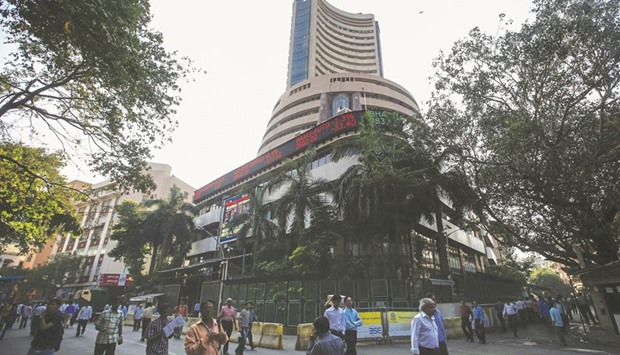India’s benchmark stock indexes posted the biggest loss among Asian gauges amid concerns about the economic impact of the government’s anti-corruption steps and persistent capital outflows from local assets.
The BSE Sensex closed lower by 385 points, or 1.47%, to 25,765, while the Nifty 50 of the National Stock Exchange fell 145 points, or 1.80%, to 7,929.
State Bank of India tumbled 6.7%, the most in nine months and the worst performance on the S&P BSE Sensex. Tata Motors, the owner of Jaguar Land Rover, dropped to a four-month low, while Maruti Suzuki India and tractor maker Mahindra & Mahindra lost at least 3%. ITC, which has the third-highest weighting in the index, slid to a six-month low.
“Today’s pattern of Indian equities moving in contrast with the Asian peers clearly shows the continuing effect of demonetisation,”said Sanjay Sinha, founder of Mumbai-based Citrus Advisors. “There will be pain in the near term as investors assess the uncertainties related to the issuance of new currency bills and the size of demand destruction due to the move.”
The Sensex has erased this year’s gains after retreating 6.6% since the government’s November 8 decision to scrap 86% of the currency notes in circulation.
There’s concern the cash crunch arising out of the move will cool demand at a time when a good monsoon after back-to-back droughts had led investors to bet on company profit growth accelerating.
The currency recall will pull down economic expansion for the year to March by 0.5 percentage points, Citigroup said in a report on the weekend.
“Investor sentiment looks weak overall amid fears of earnings downgrades for the next two quarters as brokerages start to downgrade GDP growth forecast,” Chinmay Madgulkar, an analyst at Taurus Asset Management Co in Mumbai, said by phone. “Sentiment will revive once the cash availability is restored to levels seen before the demonetisation.”
The anti-corruption measures have combined with capital outflows from emerging markets in the wake of Donald Trump’s surprise US election victory. Global funds pulled a $900mn from Indian equities last week, the highest in Asia after Taiwan, data compiled by Bloomberg show. They have withdrawn $1.5bn from local shares this month, set for the biggest outflow since February, the data show.
The Sensex trades at 15 times projected 12-month earnings, the cheapest level since May.
The MSCI Emerging Markets Index is valued at a multiple of 11.8. State Bank of India declined the most since February, while Bank of Baroda tumbled the most in three months on risk that the government’s recall of high-value currency notes will dent their profits. A gauge of lenders had its steepest fall since April.
“Banks are just exchanging money and not doing any lending for the past 10 days, which will hurt their third-quarter performance,” Rakesh Kumar, an analyst at Elara Securities India, said by phone.
“Margins for the next two quarters will take a hit.” Non-bank finance, micro-finance companies pared losses as the Reserve Bank of India eased rules related to recognition of some small loan accounts after the government’s move to ban high-value currency bills.
Shriram Transport Finance fell 0.4% after falling as much as 4.4%; Mahindra Financial cut losses to 2.7% from as much as 7.8% and Bajaj Finance fell 5.3%, paring an intraday loss of 7.2%.
Meanwhile the rupee closed at Rs68.165 against the US dollar yesterday. At 2pm, the rupee was trading at 68.16 a dollar, down 0.02% from its previous close of 68.14. The home currency opened at 68.13 against the US dollar and touched a low of 68.27 – a level last seen on March 1. So far this year, it fell 3%.
Between 9 and September 17, foreign institutional investors (FIIs) sold $1.39bn in equity and from 11 to September 17 FIIs sold $1.80bn in debt. FIIs have sold $2.07bn in debt and bought $5.43bn in equity till date this year.
The benchmark 10-year government bond yield was trading at 6.344% – a level last seen on 21 May 2009, compared to Friday’s close of 6.429%. Bond yields and prices move in opposite directions.
Asian currencies are at multi-month lows as Trump puts together an administration that supports plans for more fiscal stimulus. Deutsche and HSBC say more weakness is likely in Asian rates.
South Korean won was down 0.31%, Philippines peso 0.27%, China renminbi 0.14%, China Offshore 0.08%, Indonesian rupiah 0.05%. However, Taiwan dollar was up 0.26%, Thai Baht 0.15%.
The dollar index, which measures the US currency’s strength against major currencies, was trading at 100.98, down 0.23% from its previous close of 101.21.

People walk by the Bombay Stock Exchange building in Mumbai. The BSE Sensex closed down 385 points to 25,765 yesterday.
